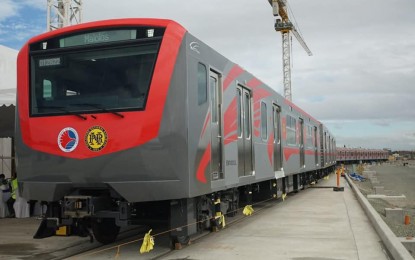
#PBBMSONA2022
MANILA – President Ferdinand “Bongbong” Marcos Jr. is determined to continue his predecessor’s ambitious “Build, Build, Build” infrastructure program but with a new focus on developing the country’s railway system.
In his first state of the nation addres, Marcos said the infrastructure program of the Duterte administration must not only continue, but also be expanded.
“We shall confidently build on this firm foundation established by my predecessor. As it is in building an edifice. We must keep the momentum. And aspire to ‘Build Better More,’” Marcos told guests at the Batasan Pambansa Complex.
According to Marcos, the government missed a great opportunity to develop our rail transport system.
“It is clear in our mind that railways offer great potential as it continues to be the cheapest way of transporting goods and passengers,” he added.
Marcos pointed out that there are a dozen rail projects – at ground, above the ground, and below ground, not just in the National Capital Region, but in five other regions – at various stages of implementation, and with a combined cost of PHP1.9 trillion.
Moreover, he said larger scale railway systems like the 102-kilometer Mindanao Railway Project; Panay Railway Project; and Cebu railway system could be integrated as a vital part of the transport and communications systems.
“We will also continue to improve our road and transportation systems in key cities across the country through various projects such as the Cebu Bus Rapid Transit, Davao High Priority Bus System, Ilocos Norte Transportation Hub, and the El Nido Transport Terminal,” Marcos said.
Marcos directed the Department of Transportation (DOTr) to build upon already existing lines by modernizing old railway systems.
“Full speed ahead! Improving our railway system, along with modernizing existing airports and seaports, will maximize our strategic location in the Pacific. And connect our many islands,” he said.
He also maintained that his administration is committed to finish building the current portfolio of investments: approved railway projects such as the North-South Commuter Railway System; the 33-kilometer Metro Manila Subway Project; the 147-kilometer North-South Commuter Railway System; the 12-kilometer LRT-1 Cavite Extension; the 23-kilometer MRT-7 and the Common Station that will connect LRT-1, MRT-3 and MRT-7.
Marcos said infrastructure development will remain a very high priority for his administration in its drive for growth and employment.
He also allayed fears that some projects would be suspended under his administration.
“Once again, I will not suspend any of the ongoing projects as those have already been shown to be of benefit to the public that they serve. I will continue to study the proposals that have been made,” Marcos said.
Infra spending
Meanwhule, Marcos said infrastructure development spending will be sustained at 5% of the gross domestic product (GDP).
“The planned expansion of infrastructure projects, I believe, would be possible if we continue to encourage the participation of the private sector in the development of our program,” he said.
Marcos said Public Private Partnerships (PPPs) offer great potential for that expansion for infrastructure development and innovation.
“Our infrastructure development is of primary importance as it is a necessary element to improve many other sectors — to include agriculture, tourism and general economic activity and even governance,” he said.
PPS can be broadly defined as a contractual agreement between the government and a private firm targeted towards financing, designing, implementing and operating infrastructure facilities and services that were traditionally provided by the public sector.
It offers monetary and non-monetary advantages for the public sector and addresses the limited funding resources for local infrastructure or development projects of the public sector thereby allowing the allocation of public funds for other local priorities. (PNA)
